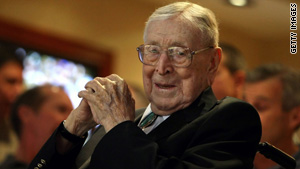
Pictures of Benito Mussolini and Adolf Hitler will be accessible
Millions of documents stored at the World War II code-breaking centre, Bletchley Park, are set to be digitised and made available online.
Electronics company Hewlett-Packard has donated a number of scanners to the centre in Milton Keynes so volunteers can begin the ground-breaking task.
Many of the records at the once-secret centre have not been touched for years.
During the war, it was home to more than 10,000 men and women who decoded encrypted German messages.
The centre hopes that once the work starts, previously untold stories about the role Bletchley Park played in the war, will be revealed.
'Trail'The first phase of the project is expected to take at least three years.
Simon Greenish, chief executive officer of the Bletchley Park Trust, said the plan was for the centre's entire archive to be digitised.
He said: "We've been wanting to do this for a while. It was first discussed five years ago, but we have just never had the funds.
"If I ever manage to secure £10,000 then that goes towards buying a new roof as this project just has not had the attention it deserves.
"But for the first time we hope we will be able to put everything into the public domain."
He said since the archive is so big nobody knows exactly what each individual document stored there contains.
However, the information they expect to dig out will definitely include communication transcripts, communiques, memoranda, photographs, maps and other material relating to key events that took place during the war.
He said: "We have many boxes full of index cards, which have lots of different messages on them. But this will be our chance to follow a trail and put the messages together so we can find out what they really mean.
"We found a card talking about 4,400 tonnes of mercury being transferred from Spain - we will be searching for further messages explaining what happened and why this was done."
He said the archive had tremendous potential and once it was online, people would find it easier to trace documents related to certain subjects within minutes - something that takes days to do now.
Pictures set to go online in the archive include ones of Adolf Hitler shortly after surviving an attempt to assassinate him. They had been taken by his official photographer Heinrich Hoffmann.

Simon Greenish Bletchley Park TrustIt is quite clear there was a lot of correspondence going on between these countries
"I'm looking toward to finding the cards relating to rubber and ball bearings and how the Germans gathered these materials.
"The Germans developed synthetic rubber as they found it hard to get natural rubber. They also needed lots of ball bearings for the war effort, which is why the allied forces attacked a lot of ball bearing factories."
He said there were records in the archive which showed countries such as Spain, Switzerland and Sweden were perhaps not as neutral as they were portrayed.
"It is quite clear there was a lot of correspondence going on between these countries," he said.
He said the volunteers had already unearthed records showing countries including Spain dealing in diamonds with the Japanese and other German allies.
He said more information about the double agent Garbo - a Spaniard whose real name was Juan Pujol Garcia - was likely to come out once the work on the archive began.
Garbo, who has been described as World War II's "greatest double agent", persuaded the Nazis that the allied forces were planning their D-Day operation in Calais rather than Normandy.
He said he was also expecting more information about the fuel the Germans were discovered to be sending to Pennemuende, a small village close to the Baltic Sea.

The hard copies of the documents are stored in a massive room
He said: "We didn't know anything about it initially, but then because of the message that Bletchley Park decoded, the allies sent a reconnaissance aircraft and they found out that rockets - weapons of terror - were being developed there. The RAF then attacked the site."
He said the documents were all important as just one obscure message could have led to thousands of lives being saved.
Laura Seymour, from Hewlett-Packard, said her company contacted Bletchley Park in September 2009 after learning of its plight.
The company donated a number of scanners and people to provide technical expertise to the charity.
Ms Seymour estimated the cost to HP was in the tens of thousands but said it was a project that was worth being involved in.
Mr Greenish believed the archive would be an important research tool and could even attract more people to the site. It would also ensure the preservation of the fragile hard copies.
Currently most of the documents are too difficult to view or handle and few have access to them. But Bletchley Park hopes that its new archive will one day be a different type of gateway to the past.
Bletchley Park WWII archive to go online
Source: BBC.COM































